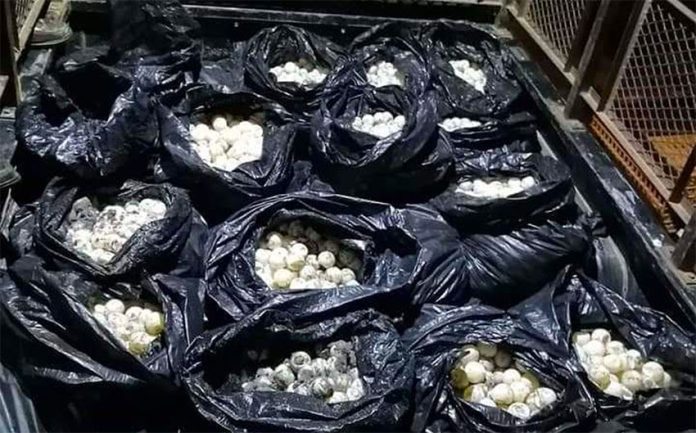A man in possession of 30,000 sea turtle eggs was arrested Thursday in Santa María Huamelula, Oaxaca, the state Attorney General’s Office reported.
The man was driving a Nissan pickup without headlights just after 10 p.m. on Thursday and refused to stop for authorities who gave chase and pulled him over. The eggs were found in the bed of the pickup in 60 black plastic bags.
The eggs were being taken to a buyer in Mexico City, authorities said. Sea turtle eggs are considered a delicacy and in some places an aphrodisiac. On the international market, just one turtle egg can be worth up to US $300.
Sea turtles and their eggs are endangered and protected under Mexican law. The man could face a fine of 300,000 pesos (US $14,186,) and up to nine years in prison for illegally collecting the eggs.
Although the sale of turtle eggs has been banned in Mexico since 1990, it continues in many locations, especially the area where the man was arrested on Oaxaca’s Pacific coast.
This latest seizure brings the total of sea turtle eggs seized by authorities in the Isthmus of Tehuantepec region to 79,000 since July.
Meanwhile, a California group of wildlife conservationists has developed a product that could help authorities fight trafficking of the eggs by identifying major trade routes as well as small-time poachers.
The non-profit Paso Pacifico has developed a decoy egg they are able to 3D print and equip with an inexpensive GPS transmitter. The eggs can then be placed in a nest of real eggs and tracked using a cell phone.
The eggs have been tested on beaches in Costa Rica with success, and they do no harm to the nests they are placed in.
“The incredible part of this egg is how it can be so cryptic and hidden among hundreds of real sea turtle eggs, and [it is] really the only way that we can figure out what happens from the time that sea turtle eggs illegally leave the beach to the time they get to consumers throughout the world,” said Paso Pacifico executive director Sarah Otterstrom.
Source: El Universal (sp), Wired (en)
